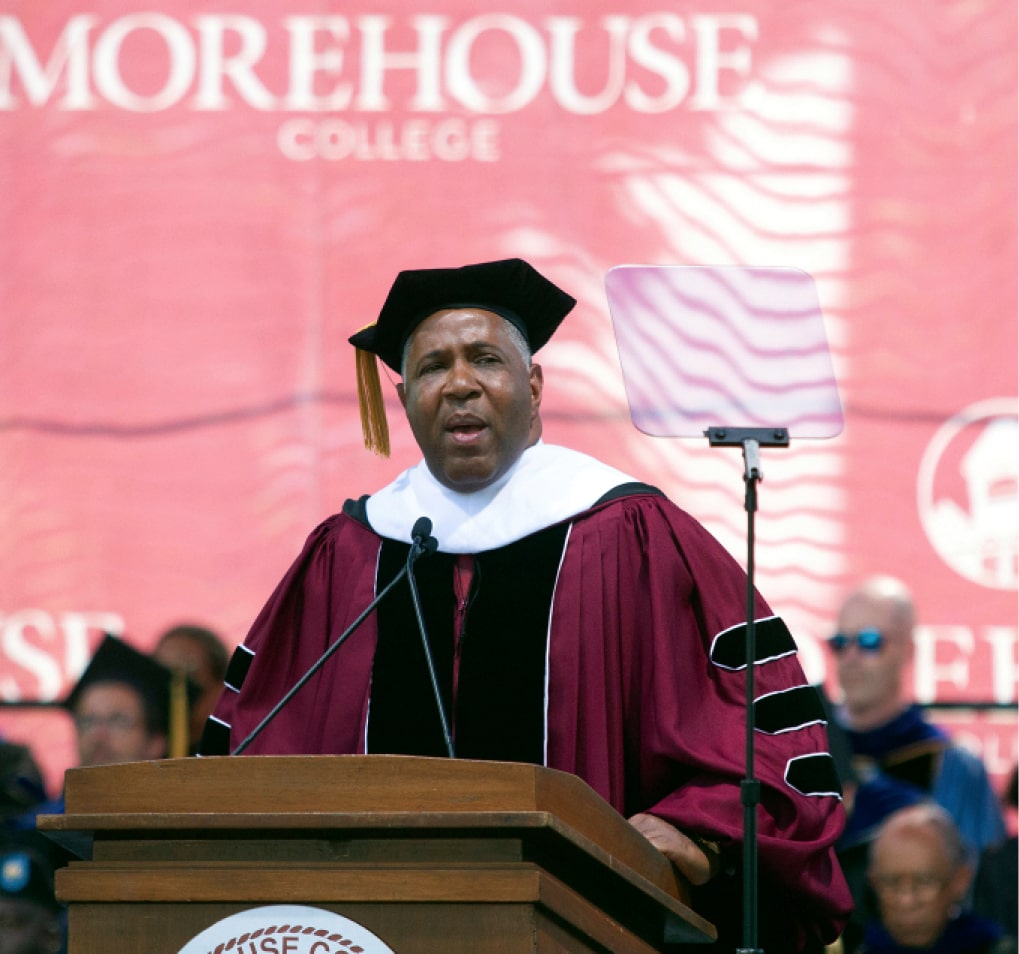Social media was alive with pledges of unity and diversity in Summer 2020. Virtual spaces echoed the relatively young and multiethnic movement in support of Black Lives Matter following the brutal and public killing of George Floyd in Minneapolis, Minnesota, on May 25. Companies and business leaders took notice. In June, promises of support for Black communities were popping up on every social platform. Some CEOs vowed action. Others, like Robert F. Smith, were ready with plans to direct the desire for change into solid scaffolding for societal transformation, to seize the opportunity to stabilize a cultural moment into momentum for change.
But the rate of change remains slow and in some cases much remains unknown.
“We can’t solve racial equity until we change the dynamics of who gets to make decisions,” Dana Lanza, CEO of the Confluence Philanthropy said in a joint report from the Associated Press (AP) and The Chronicle of Philanthropy.
As the outpouring of support for racial justice grew, financial support from individuals and corporations flowed into nonprofit grant-making organizations, according to the article, which is part of a series of collaborations titled, “America’s Racial Reckoning: What Philanthropy Has Achieved.” Journalists are investigating how billions of dollars of donations earmarked to support minority communities have been allocated.
Ellie Buteau, Vice President of Research for the Center for Effective Philanthropy (CEP) told investigative reporters that while many charitable foundations recognized they had yet to make significant progress toward racial equity, they remained uncertain about how to act.
Buteau conducted a survey, “Foundations Respond to Crisis: Toward Equity,” showing that approximately 75% of 236 foundations who participated in the survey had “initiated efforts to support nonprofits that serve communities of color.” But Buteau found few foundations had committed to “making permanent structural changes,” such as diversifying the board of directors or altering hiring or grant-making practices.
“[…] many of them are unsure of exactly what to do,” Buteau summarized.
Board Diversity Saw Setback for Black Men Until June 2020
A recent report showed progress made in diversifying boards collected up to June 2020 showed it would be at least 20 years before board diversity would reach a state of parity to the general population. But, according to The New York Times, another data set shows that from July 2020 onward, “the number of Black directors on boards of S&P 500 companies surged by nearly 200 percent, representing 32 percent of all newly appointed directors, up from 11 percent in 2019.”
The latter analysis comes from Institutional Shareholder Services (ISS), a private research company. ISS also found that roughly half of the board positions were new additions to publicly traded company boards. The Times reported that ISS did not include a gender breakdown and the group credited the shift to the public’s demand for racial justice.
Had the same snail pace of change continued, it might have taken until 2046 for minority women to hold 20% of Fortune 100 seats according to The Board Diversity Census of Women and Minorities on Fortune 500 Boards.
That report, which was published June 25, 2021 in the Harvard Law School Forum on Corporate Governance, was a collaboration by the Alliance for Board Diversity (ABD) with Deloitte & Touche LLP. The group gathered U.S. Census data up to June 2020 regarding the percentage of women and minorities on public company boards of directors in large U.S.-based companies. The findings showed little progress was made by nonwhite C-suite level executives in the years leading up to 2020.
The Positives: Pipelines for Change in Business and Banking
The push for corporate diversity isn’t new, but in the United States, demographics and buying power are growing more diverse by the year. And business leaders don’t have to be progressive to recognize that change will benefit their bottom line.
Business
Coalitions for change have been making an impact over the past year. Top CEOs who comprise the Business Roundtable announced in October 2020 corporate initiatives to advance racial equity and justice, as well as transparency.
“[…] And we know that a diverse and inclusive workplace is also crucial to business success. It creates a strong workforce and promotes fresh, innovative thinking. As business leaders, we are collectively opening new paths to jobs and career advancement by reviewing our hiring and promoting practices. We support policy actions that ease student debt burdens, increase access to high quality and affordable pre-K and K-12 education, and increase federal support for HBCUs and other minority-serving institutions,” wrote Mary Barra, Chairman and CEO of General Motors. Barra chairs the Business Roundtable Racial Equity and Justice Subcommittee on Education and Workforce.
In December 2020, the NASDAQ Composite, a stock index, announced new rules for all companies it lists, mandating that corporate boards have at least two directors who represent underrepresented groups, which include: women, ethnic minorities and LGBTQ+ people. The justification for the rule change was economic best practices. Data shows companies with diverse boards perform better.
Banks
Investment banks have used their quantitative powers to analyse data and come up with solutions to systemic issues in finance.
- In March 2021, Goldman Sachs launched the decade long “One Million Black Women” initiative, partnering with organizations led by Black women Goldman will direct $10 billion in direct capital investments and $100 in philanthropic support to effect change in racial and gender disparities impacting access to opportunities.
- In September 2020, the Bank of America (BOA) launched a five-year Equality Progress Sustainability Bond “specifically designed to advance racial equality, economic opportunity and environmental sustainability” according to the BOA. The $2 billion bond is an industry first.
These efforts took a hard look at facts gathered from federal and state data. The Goldman initiative targets the wage gap and loan financing faced by Black women at work and as entrepreneurs. The BOA bond will focus on loans for affordable and sustainable housing development, minority community medical practices, Black and Brown-led small business loans and the capitalizing of smaller capillary banking systems that will reach underserved communities.
Promises to Be Realized
In an interview with Quartz, Amity Paye, Interim Director of Storytelling & Marketing and the Senior Director of Communications for Color of Change, a civil rights advocacy nonprofit, talked about the effect of public-facing representation.
Paye explained that while it is important to have representation at all employment levels within a company, what a company displays as an advertising identity also matters. All people want and need to see themselves reflected in definitions of beauty.
“Representation is a statement of who a company values,” Paye told Quartz in the article which looked to quantify whether promises made last year on social media by brands regarding representation had been realized. In May, Quartz published an analysis of the skin tones in 27,000 Instagram posts by 34 beauty and fashion industry brands over the last year to find out which have kept their word regarding diversity. They looked at representation before and after solidarity, diversity and equity statements were made. They found that “only a few brands significantly changed the diversity of skin tones on their Instagram feeds.” And companies, like Sephora, which already had darker skin tones than other brands, nudged slightly darker.
- Sephora, owned by Moët Hennessy Louis Vuitton, also stood out as a leader when the company took a pledge to allocate 15% of retail space to Black-owned brands. A wise choice in a market driven by African American consumption.
- Luxury fashion brand Burberry, which already had a diverse portfolio of models maintained it’s lead before and after its statement supporting Black Lives Matter.
- Of the mass-market fashion industry brands, Victoria’s Secret showed the most change and Old Navy the least.
- And, of the contemporary fashion brands, Polo Ralph Lauren consistently used more models with darker skin tones than other brands but ended up going lighter by the end of the year.
While such data might seem to be superficial, branding images send signals to consumers about who the brand values and how it wants to be perceived.
Behind the corporate mask of social media other steps toward equity are of vital importance. Equitable hiring, board representation and supply chain practices are all necessary to make real and lasting changes to benefit all Americans.
The 2% Solution
There is a path forward for corporations and foundations looking to make permanent change.
Smith has offered The 2% Solution as a plan for an equitable future in one generation.
“The largest companies can and should invest in the common social good and contribute to our shared national community, and their ability to provide capital at scale creates a powerful engine for systemic and permanent change,” Robert F. Smith wrote in a recent contributor post on the Quartz website.
The idea is to build pathways to inclusion to benefit all Americans. The lingering systemic and cultural inequities in America that persist in systems of justice, banking, education, health and business. These serve not only as barriers to equity, but also impact the economy. The future of American prosperity depends on diversity.
Find facts, data and what’s happening to move The 2% Solution and an equitable society forward.







